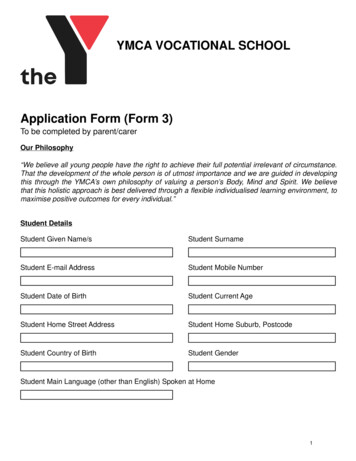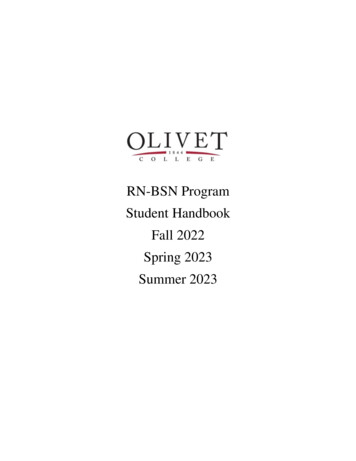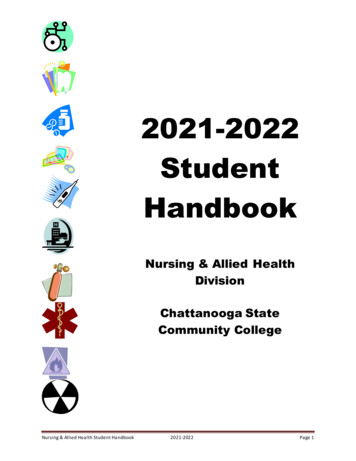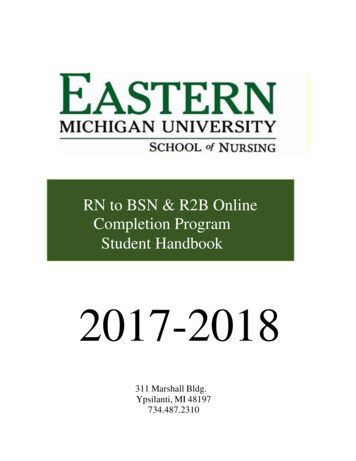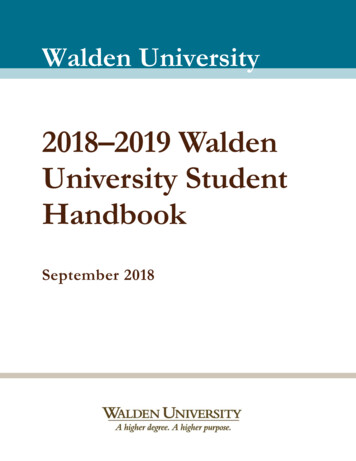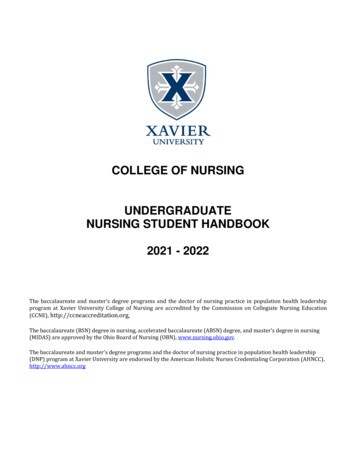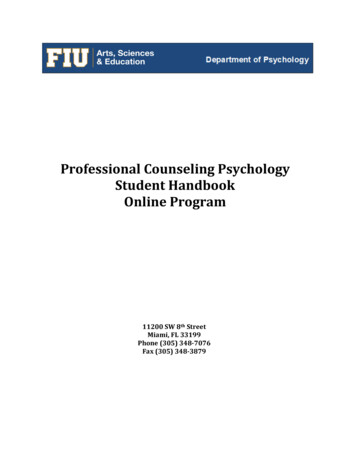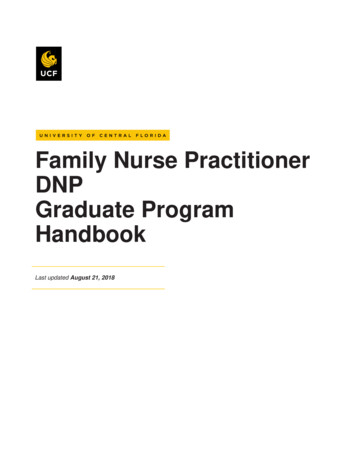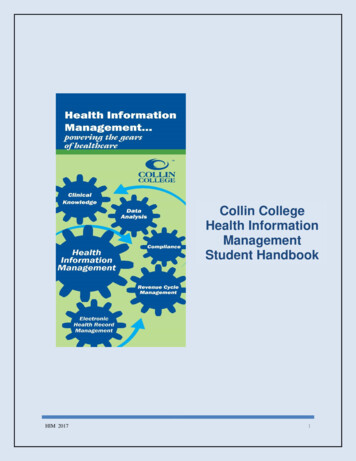
Transcription
Collin CollegeHealth InformationManagementStudent HandbookHIM 20171
FOREWORDThe goal of the Health Information Management (HIM) Program at Collin College is tograduate competent health information management professionals for the healthcareworkforce. The program follows the guidelines set forth by the Texas Higher EducationCoordinating Board, Commission on Accreditation for Health Informatics andInformation Management Education (CAHIIM), the American Health InformationManagement Association (AHIMA), Collin College mission, and the Advisory Committeefor the Health Information Management program.All students are treated with respect and dignity. Collin College does not discriminate onthe basis of race, color, religion, age, sex, national origin, disability or veteran status.This handbook outlines many of the issues that are of interest to students enrolled inthis program. The HIM program is a 60 credit hour program of online and ProfessionalPractice Experience (PPE/Clinical) instruction. Students who successfully complete allrequirements are awarded the Associate of Applied Science (AAS) in Health InformationManagement degree and are eligible to take the national credentialing exam given bythe American Health Information Management Association (AHIMA).Please note that to be eligible for an AAS-HIM degree, a student must complete therequirements set forth by the college catalog; this includes “AAS core courses”, as wellas the HIM component. Please consult the college catalog for complete degreerequirements.This handbook is intended to serve only as a general guideline for the program. Morespecific policies may be found in several sources including the Collin College Catalogand the Collin College Student Handbook. In the absence of specific practices andprocedures, the program director and/or college administration will decide variousissues based on, but not limited to, the following guidelines:a.Preservation of academic standards.b.Present and future integrity of the program.c.Ability of the program to carry out its goals and objectives.The program may, at any time, enact new practices or procedures deemed necessaryto maintain the above guidelines. Therefore, the information in this handbook is subjectto change without prior written notice.ACCREDITATIONThe HIM (Associate degree) program is accredited by the Commission onAccreditation for Informatics and Information Management (CAHIIM) whichenforces HIM curriculum developed by the Council for Excellence in Education(CEE).HIM 20172
HIM Program EligibilityThe Collin College HIM program is a selective admission program. Students must have a GPAof 2.5 or better and pass the pre-requisite classes (BIOL 2404, HITT 1305, and HITT 2471) witha “C” or better. As degree seeking, students should complete the TSI Math/English Assessment(unless otherwise exempt) through Academic Advising for placement in the appropriate level ofMath and English courses. As part of the application packet, students should supply their TEASscores (a minimum overall 60% score is required), two letters of reference (it can be fromcolleagues, professors, etc.), and an essay detailing your interest in pursuing HIM along withtheir application. If students are under current discipline action by the college, they are noteligible for admission into the program. Students who have a history of disciplinary action, notcurrently active, are eligible to apply to the program provided they agree to conditionalacceptance, in writing.The Application packet may be emailed to the program director, mailed, or delivered to theHealth Science office in the Health Sciences building on the Central Park Campus, Suite 201.Applications are due the second Friday in November and the second Friday in May. Prospectivestudents are encouraged to contact the program director with any questions.I.GENERAL PROGRAM GUIDELINESI.A Program ExpectationsOnce admitted, students commit to timely completion of the program (no more than threeyears). Students conduct themselves in a professional manner, regardless of setting. Studentsare accountable and responsible in online courses as well as on site PPE placement. This is aprogram that provides students an opportunity to sit for the national credential. Students shouldexpect to sit for the credential or to continue their education.I.B Program ProgressionThe program director provides a course layout detailing required courses by semester untilgraduation. A student should plan on completing 18 hours per academic year until completion.In the event a student is unable to maintain the agreed upon schedule, they must notify thedirector. Students may find themselves in an “inactive progression” status if the GPA falls belowa 2.5, a temporary leave from the program, etc. In order to move back into active status, astudent MUST meet with the Director to re-formulate a succession plan to graduation. This mayinclude taking courses again depending on circumstances.Course permits are required for HITT 1160 (PPE/Clinical I), HITT 2361, and HITT 2249. Whenyou are ready to register for these classes, email the program director. You will receive PPEclearance once you satisfy PPE documentation requirementsI.C Course DeliveryThe scheduled times for academic classes are listed in the college class schedule. All coursesfor the degree are offered in an online format. The Professional Practice Experience(PPE/Clinical) component requires the student to participate at a healthcare facility. Studentparticipation based on instructor syllabus and web course guidelines are mandatory. Theprogram adheres to an online Code of Conduct and students are required to follow thosepolicies.HIM 20173
I.D Grade InformationThe Collin College HIM program maintains a rigorous academic standard. The grade scale is asfollows A – 90-100B – 80-89C* – 75-79F – Below 75* The minimum competency level in all courses is a grade of a C. Students scoring a grade of “F” in anycourse may not progress to the next course(s) until that course is repeated, and passed with a minimumgrade of C.The Program will adhere to FERPA (Family Educational Rights and Privacy Act) and collegeguidelines when reporting grades. Grades will be disclosed only to the student and no electronicnotification will be provided.I.E Transfer CreditPrior college coursework for transfer credit should be evaluated by the program director.I.F Scholastic DishonestySee Collin College Handbook Section 7-2.2 for scholastic dishonesty information.I.G TeamworkThe Collin College HIM program prepares students for the workforce which includes the hardand soft skills. Teamwork is critically important to the success of any institution. Being part of ateam means performing alongside persons of varying ethnic backgrounds, national origin,political and religious beliefs, as well as other differences. Very diverse groups often cometogether to share a common goal of caring for one another and others. By communicatingeffectively, and working together smoothly, the group carries out its goals successfully. Manystudies show that collaborative efforts improve outcomes, and therefore teamwork is oftensuperior to individual efforts.The cooperative and collaborative group is one that we will model in health information courses.“Team First” is our goal in order to foster a learning environment of excellence.I.H Chain of CommandStudents in the program will follow the chain of command for grievances. Students areinstructed to follow the chain of command. Failure to respect the chain of command isconsidered unprofessional behavior. The chain of command is as follows: Take a complaint to the instructor first. It is unprofessional to discussissues or problems with those that are not directly involved.The instructor will follow-up and give you a report.If the grievance remains unresolved, take the issue to the Program Director. After a period ofinvestigation the appropriate person will report to you on the issue.If the situation remains unresolved, contact the Dean of Health Sciences & Emergency Services.In the event that an individual is believed to have violated the code of conduct, that individual issubject to disciplinary action. The individual may be asked to participate in specific traininggeared toward helping the individual deal with difficult or challenging situations moreappropriately. Repeated incidences may result in written advising, and/or (depending upon theseriousness of the problems) dismissal from the program.HIM 20174
I.I Professional OrganizationsStudents are encouraged to become involved with the professional organizations related toHIM. In the Dallas area there is the DFWHIMA and DFWHIMSS. There is the Texas chapter ofHIMA and the national organizations, American Health Information Management Association(AHIMA) and Health Information Management Systems Society. For students interested inAHIMA, the Education Program Code (EPC) is 725. Visit ahima.org for more details.II.Professional Practice Experience (PPE/Clinical)The Health Information Management student will receive instruction in the fundamentals of allareas involved in health information management. To compliment academic training, thestudent will rotate through an area healthcare facility for a total of 96 hours (HITT 1160 - 16hours and HITT 2361 - 80 hours). This will help the student with his/her skills previously learnedin the classroom/lab and is an unpaid clinical rotation. The Director of the HIM Program orPPE/Clinical Site Coordinator will make every effort to place the students at a facility near theirhome or work when possible. If you are currently working at a healthcare facility, you will beplaced in an alternate site.Only students that have satisfactory standing in all course work will be eligible to beginPPE/Clinical training.II.A PPE EligibilityPrior to placement, students must satisfy immunization and insurance requirements as well as abackground check and drug screen. These requirements are stipulated by our PPE partnersand adhered to by the HIM program. Students establish an account with CastleBranch (thedocument management company) and upload their documentation for review by the PPEcoordinator.II.A.1 ImmunizationsState law and Collin College Health Information Management Program require the followingimmunizations prior to placement in PPE/Clinical site: Mumps, Measles, Rubella, or titer showing immunity.Varicella, or titer showing immunity.Tetanus/Diphtheria (within past ten years).Influenza (one dose annually as available or as recommended by CDC).Hepatitis B series. Please note that it may take 3-6 months to complete the series.The student will not be allowed to attend Professional Practice Experiences untildocumentation of Hepatitis B is provided. All students must have a TB skin test annually. The costs of these tests are the student’sresponsibility.Other vaccinations may be required of certain individuals, particularly those with healthconcerns. Please refer to the Texas Department of Health’s website listed below. Information on immunizations can be accessed at the Texas Department of Health’swebsite: http://www.tdh.texas.gov/immunize/vischart.htmHIM 20175
II.A.2 Liability InsuranceAssessed as a fee upon registration for HITT 1160 and 2361.II.A.3 Health InsuranceStudents are required to have health insurance coverage while in PPE/Clinical experiences andwill be asked to provide proof of personal medical coverage before starting onsite assignment.The college and the clinical affiliates (per our agreement with the facilities), have noresponsibility for the student’s health care. Any personal, health related expenses incurredduring the course of PPE/Clinical training are the responsibility of the student.II.A.4 Background ScreeningStudents must submit to a criminal background screening. Any criminal records are a matter ofpublic record and are subject to disclosure to all facilities where students participate inPPE/Clinical practice. It will be the burden of the facility to reject or accept a student based onthe information in the background check.II.A.5 Drug TestingCollin College Health Information Management Program requires students to be drug screenedprior to entering the Professional Practice Experience (PPE/Clinical). No student will beadmitted to PPE/Clinical sites that has either a positive test, fails to take the test, or has takenthe test at some place or time other than prescribed by the program. Previous drug screens areunacceptable. Random drug screens may be conducted during the PPE/Clinical practiceexperience. Students may also be required to retest following any PPE/Clinical incident orinfraction of PPE/Clinical affiliate policies or regulations. Students are responsible for the cost ofthe drug screen test (approximately 30). They must complete the drug test on the assigneddate. Failure to do so may be considered equivalent to a positive test.In the case of a positive test, the Medical Review Officer (MRO) of the participating lab maycontact the student for information related to current and valid prescription drug use. The MROwill verify valid and current prescriptions with the student’s attending physician. In the case of apositive test, students may request a retest. Please note that hair analysis may be used for thatretest, and at the financial responsibility of the student.Students must submit to a drug screening on the date notified by the Program Director. Theprogram may only give 24 hours’ notice to complete any drug screen. Failure to complete thedrug test by the assigned date may be considered equivalent to a positive test.II.B PPE ObjectivesThe PPE opportunity is designed to introduce the student to the healthcare environment and tofamiliarize him/her with the Health Information Management role.Other objectives To allow the student to develop a rapport with members of the healthcare team.To develop the student’s knowledge of medical ethics.To develop psycho-motor skills necessary to perform tasks effectively and efficiently.To learn procedures and techniques used in the administration of health information.To understand professional behaviors necessary to succeed in the workplace.HIM 20176
II.C PPE Professionalism On-SiteII.C.1 AppearanceClean and professional attire during all PPE/Clinical hours is required. Most sites requirebusiness casual attire. In keeping with the professional atmosphere of the healthcare institution,the student will adhere to the PPE/Clinical Site dress code and badge policy: The name badge or ID, purchased from student activities, must be worn to PPE/Clinicalsites. Any name tag supplied by the PPE/Clinical affiliate must be worn according to thataffiliate’s policy.If ANY of the policies listed above are not adhered to, the student will receive ONE WARNINGONLY. The next time, he/she will be sent home and counted absent from the PPE/Clinical site.A student determined to be in violation of the dress code by a PPE/Clinical preceptor or facultymember may be sent home from PPE/Clinical assignment. The Collin College HIM faculty mustbe notified of any violation in the dress code. If a student is sent home, the time will be recordedas unexcused.II.C.2 PPE /Clinical TardinessIt is equally important that a student be punctual for the Professional Practice Experiences(PPE/Clinical). In order for the student to obtain maximum benefit from the opportunity, he/shemust be present at the time assigned. An appeal of a decision involving the policy forattendance or tardiness during professional experience should be made to the Program Directorafter discussion with the PPE/Clinical instructor.II.C.3 Parking at PPE/Clinical SitesStudents are strongly encouraged to use parking facilities provided by the facility.II.C.4 PPE/Clinical EvaluationA Professional Practice Experience (PPE/Clinical) Evaluation Form will be used by yourPPE/Clinical Preceptor to set up and monitor your professional practice experiences. You willmeet with your PPE/Clinical Preceptor to discuss performance objectives the first week ofprofessional practice. At this time it is appropriate to discuss what projects and activities will beimportant for you to demonstrate satisfactory performance on the program exit competencies.An additional aspect of the Professional Practice Experience (PPE/Clinical) is the StudentPortfolio. Materials added to your portfolio during professional practice should demonstrate youraccomplishments to the program and future employers.II.C.5 PPE/Clinical IncidentsPPE/Clinical incidents fall into three categories: immediate dismissal, 2 incident, or threeincident.Immediate dismissalAny student committing any of the following offenses will be subject to immediate removal fromthe program (not necessarily Collin College). A deliberate action, which has or has the potential to cause serious physical oremotional harm to patients or personnel.HIM 20177
Coming to the PPE/Clinical sites under the influence of any non-prescribed drug thatadversely affects the student’s performance during the clinical rotation or bringing saiddrugs into the hospital or consuming drugs on hospital property.A verbal or physical act of aggression against another person on facility premises.Theft of hospital, facility, patient, student, or visitor property.Deliberate destruction or damage to hospital, facility, patient, student, or visitor property.Deliberate falsification of hospital or facility records either by omission or addition.HIPAA violationsTwo Phase Incident Discipline ActionThe student committing any of the offenses listed will be subject to the following disciplinaryactions:First incident - probation (probationary status will continue for the duration of the student’senrollment in the program).Second incident - dismissal from the Program (not necessarily Collin College). Causing damage to hospital, facility, patient, student, or visitor property throughnegligence. Causing injury or potential harm to patient through negligence. Insubordination or refusal to obey an order from a superior or supervisor. There are twoexceptions to insubordination.o The student is not qualified to perform the task.o When proper supervision is lacking.Three Phase Incident Discipline ActionA student committing the offenses listed below will be subject to the following disciplinaryactions:First incident - verbal warningSecond incident - written reprimandThird incident - dismissal from the Program (not necessarily Collin College) Failure to follow published departmental rules or policies.Failure to follow published program rules and policies.NOTE: During professional experiences, it is important that serious incidents be documented atthe College. A PPE/Clinical Incident Form is included in this student handbook (Appendix B)and must be completed and submitted to the Program Director within 24 hours of occurrence.APPEAL PROCEDUREThe student may appeal a PPE/Clinical Incident Form to the Program Director. If the student isnot satisfied with the decision, he/she may initiate the Collin College Grievance Policy throughthe office of the Dean of Health Science and Emergency Services. A copy of this policy can befound in the Collin College student handbook.HIM 20178
II.D Responsibilities of the PPE/Clinical site FacilityCollin College has current affiliation agreements with all the clinical facilities where our studentscomplete clinical rotations. The clinical affiliation agreement is a legally binding document thatsets the guidelines for both the college and the facility. The following is merely a reflection of theagreement for clarification purposes and does not supersede the agreement:The Facility will permit students of Collin College to practice under the supervision of Collegefaculty or designated individuals in the department. The individual faculty member will beresponsible to the liaison person designated by the Facility for health information managementstudent activities.The period of assignments shall be during regular Collin College academic sessions.Collin College will provide the Facility with the names of the students who are entitled to use theresources of the Facility under the terms of their agreement.The student agrees to abide by rules, regulations, and policies set forth by the clinical site’smedical records department. The student is to respect the authority of the supervisor and chainof command while functioning in the PPE/Clinical facility. In the event clinical affiliate policies orprocedures seem to conflict with college policy, please notify the Program Director of the collegeimmediately.The Facility further agrees:To maintain the criteria for accreditation as established by the Joint Commission forAccreditation of Healthcare Organizations or other appropriate accrediting agencies.To provide Collin College the necessary space or facilities for conference and classroomareas for student teaching, as available.To allow students and faculty members of Collin College to utilize the Facility’s eatingfacilities at the student and faculty’s personal expense (in some instances at a reduced rateconsistent with employees).III. Collin College InformationIII.A Mission StatementCollin College is a student and community –centered institution committed to developing skills,strengthening character, and challenging the intellect.HIM 20179
III.B Core ValuesWe have a passion for: Learning Service and Involvement Creativity and Innovation Academic Excellence Dignity and Respect IntegrityIII.C Philosophy and Purpose StatementThrough its campuses, centers and programs Collin College fulfills its statutory charge toprovide: Academic courses in the arts and sciences to transfer to senior institutions. Technical programs, leading to associate degrees or certificates, designed to developmarketable skills and promote economic development. Continuing adult education programs for academic, professional, occupational andcultural enhancement. Developmental education and literacy programs designed to improve the basic skills ofstudents. A program of student development services and learning resources designed to assistindividuals in achieving their educational and career goals. Workforce, economic, and community development initiatives designed to meet localand statewide needs. Other purposes as may be directed by the Collin Board of Trustees and/or the laws ofthe State of Texas.EndorsementsThe naming of specific product, procedure, or item of equipment does not constitute anendorsement of the same by Collin College.HIM 201710
Appendix AAHIMA Code of Ethics PrinciplesThe following ethical principles are based on the core values of the American HealthInformation Management Association and apply to all AHIMA members andcertificants. Guidelines included for each ethical principle are a non-inclusive list ofbehaviors and situations that can help to clarify the principle. They are not meant to bea comprehensive list of all situations that can occur.I.Advocate, uphold, and defend the individual's right to privacy and thedoctrine of confidentiality in the use and disclosure of information.A health information management professional shall:1.1. Safeguard all confidential patient information to include, but not limited to, personal,health, financial, genetic, and outcome information.1.2. Engage in social and political action that supports the protection of privacy andconfidentiality, and be aware of the impact of the political arena on the healthinformation issues for the healthcare industry.1.3. Advocate for changes in policy and legislation to ensure protection of privacy andconfidentiality, compliance, and other issues that surface as advocacy issues andfacilitate informed participation by the public on these issues.1.4. Protect the confidentiality of all information obtained in the course of professionalservice. Disclose only information that is directly relevant or necessary to achieve thepurpose of disclosure. Release information only with valid authorization from a patientor a person legally authorized to consent on behalf of a patient or as authorized byfederal or state regulations. The minimum necessary standard is essential whenreleasing health information for disclosure activities.1.5. Promote the obligation to respect privacy by respecting confidential informationshared among colleagues, while responding to requests from the legal profession, themedia, or other non-healthcare related individuals, during presentations or teaching andin situations that could cause harm to persons.1.6. Respond promptly and appropriately to patient requests to exercise their privacyrights (e.g., access, amendments, restriction, confidential communication, etc.). Answertruthfully all patients’ questions concerning their rights to review and annotate theirpersonal biomedical data and seek to facilitate patients’ legitimate right to exercisethose rights.HIM 201711
II.Put service and the health and welfare of persons before self-interest andconduct oneself in the practice of the profession so as to bring honor tooneself, peers, and to the health information management profession.A health information management professional shall:2.1. Act with integrity, behave in a trustworthy manner, elevate service to others aboveself-interest, and promote high standards of practice in every setting.2.2. Be aware of the profession's mission, values, and ethical principles, and practice ina manner consistent with them by acting honestly and responsibly.2.3. Anticipate, clarify, and avoid any conflict of interest, to all parties concerned, whendealing with consumers, consulting with competitors, in providing services requiringpotentially conflicting roles (for example, finding out information about one facility thatwould help a competitor), or serving the Association in a volunteer capacity. Theconflicting roles or responsibilities must be clarified and appropriate action taken tominimize any conflict of interest.2.4. Ensure that the working environment is consistent and encourages compliance withthe AHIMA Code of Ethics, taking reasonable steps to eliminate any conditions in theirorganizations that violate, interfere with, or discourage compliance with the code.2.5. Take responsibility and credit, including authorship credit, only for work theyactually perform or to which they contribute. Honestly acknowledge the work of and thecontributions made by others verbally or written, such as in publication.A health information management professional shall not:2.6. Permit one’s private conduct to interfere with the ability to fulfill one’s professionalresponsibilities.2.7. Take unfair advantage of any professional relationship or exploit others to furtherone’s own personal, religious, political, or business interests.III.Preserve, protect, and secure personal health information in any form ormedium and hold in the highest regards health information and otherinformation of a confidential nature obtained in an official capacity, takinginto account the applicable statutes and regulations.A health information management professional shall:3.1. Safeguard the privacy and security of written and electronic health information andother sensitive information. Take reasonable steps to ensure that health information isstored securely and that patients' data is not available to others who are not authorizedto have access. Prevent inappropriate disclosure of individually identifiable information.HIM 201712
3.2. Take precautions to ensure and maintain the confidentiality of informationtransmitted, transferred, or disposed of in the event of termination, incapacitation, ordeath of a healthcare provider to other parties through the use of any media.3.3. Inform recipients of the limitations and risks associated with providing services viaelectronic or social media (e.g., computer, telephone, fax, radio, and television).IV.Refuse to participate in or conceal unethical practices or procedures andreport such practices.A health information management professional shall:4.1. Act in a professional and ethical manner at all times.4.2. Take adequate measures to discourage, prevent, expose, and correct the unethicalconduct of colleagues. If needed, utilize the Professional Ethics Committee Policiesand Procedures for potential ethics complaints.4.3. Be knowledgeable about established policies and procedures for handling concernsabout colleagues' unethical behavior. These include policies and procedures created byAHIMA, licensing and regulatory bodies, employers, supervisors, agencies, and otherprofessional organizations.4.4. Seek resolution if there is a belief that a colleague has acted unethically or if thereis a belief of incompetence or impairment by discussing one’s concerns with thecolleague when feasible and when such discussion is likely to be productive.4.5. Consult with a colleague when feasible and assist the colleague in taking remedialaction when there is direct knowledge of a health information management colleague'sincompetence or impairment.4.6. Take action through appropriate formal channels, such as contacting anaccreditation or regulatory body and/or the AHIMA Professional Ethics Committee ifneeded.4.7. Cooperate with lawful authorities as appropriate.A health information management professional shall not:4.8. Participate in, condone, or be associated with dishonesty, fraud and abuse, ordeception. A non-inclusive list of examples includes:HIM 2017 Allowing patterns of optimizing or minimizing documentation and/orcoding to impact payment Assigning codes without physician documentation Coding when documentation does not justify the diagnoses orprocedures that have been billed13
Coding an inappropriate level of service Miscoding to avoid conflict with others Engaging in negligent coding practices Hiding or ignoring review outcomes, such as performance data Failing to report licensure status for a physician through theappr
The goal of the Health Information Management (HIM) Program at Collin College is to graduate competent health information management professionals for the healthcare workforce. The program follows the guidelines set forth by the Texas Higher Education Coordinating Board, Commission on Accreditation for Health Informatics and

